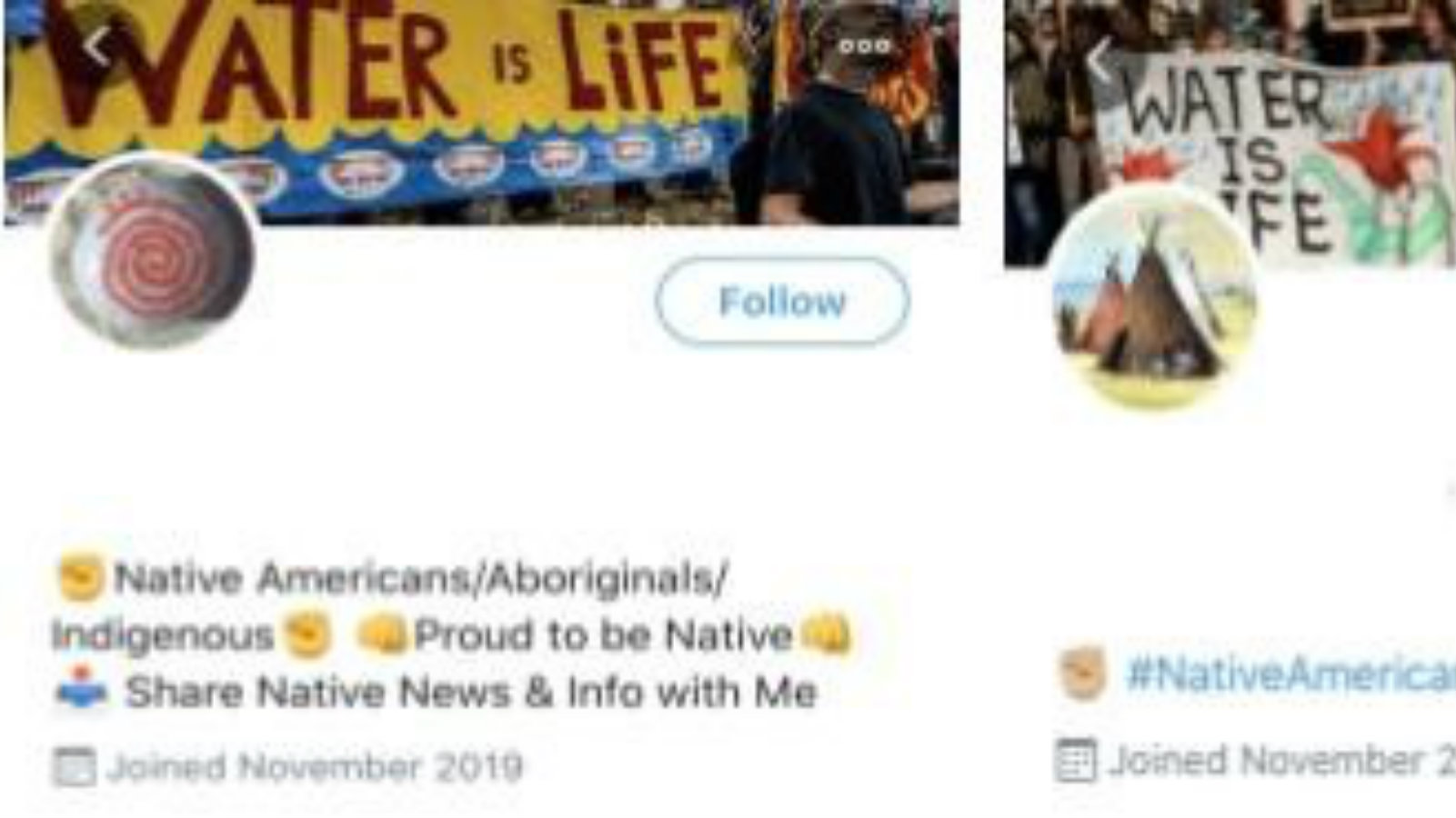
By Saiph Savage, Eber Betanzos and Amy Ruckes, for Disinfo Portal
Disruptive social media accounts are appropriating images related to Native Americans and exploiting them through computational propaganda. Online accounts are weaponizing Native names and concepts to create divisive content to troll politicians and promote a particular political agenda. This online propaganda is likely influencing electoral participation, encouraging social division, and inflaming protests. Despite the growth of this type of content, research has been limited to Native American social media use and not possible exploitation. The normalization of racism against Native Americans has possibly contributed to this propaganda going unnoticed within society.
Data to analyze this topic was collected using political social media content that integrated Native American names and cultural references. Initial observations of how Native American issues are exploited for political agendas pointed to three types of computational propaganda, which included Native American cultural references: using Native American identity to attack political opponents; weaponizing economic concerns of Native American Tribal Nations; utilizing Indigenous identity for anti-immigration propaganda.
Attack Political Opponents via Native American Identity
Collected data identified social media accounts appropriating the identity of Native Americans (native names, clothing, imagery) to portray political actors in a negative light. Native identity was used in political propaganda attacking Elizabeth Warren’s first political campaign. The propaganda aimed to ridicule her by labelling her a fake. The online weaponization of Native identity began in May 2012 and has resulted in ceaseless political attacks, various derogatory hashtags (e.g., #Fauxcahontas, #Liewatha, #MeSioux), and racist memes such as:
Media outlets such as Breitbart and FOX News, as well as comedians, have also mimicked the trolling and used it for laughs. While Senator Elizabeth Warren was the initial recipient of the weaponization of Native identity for political propaganda, the association of Native identity with being fake has resulted in trolling of President Donald Trump with the hashtag #Brokeahontas in order to convey the message of him being a fake billionaire. Media figures have also mimicked the trolling by using this hashtag for laughs, e.g., Bill Maher, resulting in a worldwide Twitter trending topic.
Using the analyzation tool Hashtagify, the utilization of hashtags surrounding politicians Senator Warren (#fauxcahontas) and President Trump (#brokeahontas) can be analyzed with the following insights:
- Top influencers were politically partisan.
- #fauxcahontas was promoted by @michellemalkin (Conservative American political commentator), @RealJamesWoods (American actor known to share viral pro-Republican content), and @DonaldTrumpJr (son of President Donald Trump and campaign surrogate).
- #brokeahontas was promoted by @TheRickWilson (Republican political strategist and Trump critic since 2010), @RawStory (left-wing partisan news organization which gained internet prominence during the 2016 campaign), and @SayHummingbird (Twitter account leading the “resistance against Trump”)
- Hashtag promotion was primarily conducted by accounts within the United States. However, there was some sharing activity from foreign entities for the hashtags #Fauxcahontas and #Brokeahontas, indicating involvement from Russia. One possible explanation for the foreign activity could be paid bots or trolls from bot farms in this region. It is important to note, however, that the related hashtags of #Liewatha and #Mesioux (which were similarly used to attack Senator Warren via Native American identity) demonstrated no activity from Russia.


- Evidence of Hashtag Hijacking. #Brokeahontas usually appeared with #Trump, #MAGA, and #LiarInChief; while #Fauxcahontas appeared with #MAGA, #Liewatha, and #ElizabethWarren. One of the most popular tweets came from @realJamesWoods who hijacked the Trending Topic hashtag of #GuiltyPleasure to share a tweet related to Elizabeth Warren and her Native American identity (this behavior was also present on Facebook). Interestingly, the association of #MAGA with the hashtags didn’t fall along partisan lines (possible explanations might be trending potential, foreign actors, or White nationalism).
Weaponize Economic Concerns of Native Nations
Evidence gathered also identified that computational propaganda around Native Americans and Native economic concerns was being generated and shared on social media to promote political agendas relating to financial issues. Tribal lands face multiple pressures concerning federal recognition, economic development barriers, and litigation. Additionally, casino gaming rights are another asset that provides necessary income for tribal governments and is vulnerable to computational manipulations which might result in electoral losses for gaming rights ballot initiatives.
Foreign actors use online propaganda to create economic disruptions to US energy supplies. Online propaganda could influence Native American protest movements and thus ultimately affect energy markets. Native American protests focus on protecting their land, which they see as sacred, from e.g., fracking, pipeline, or arctic development. As foreign actors seek to heighten societal divisions, Native American protest movements focused on Native American environmental and territorial issues, e.g. Standing Rock, will receive attention as a means to achieving this goal.
As the US presidential election speeds up and social media polarization increases concurrently, new Twitter accounts have emerged that exploited content about economic resources of Native Americans. The majority of these accounts were created in the last month and hardly engaged with other accounts. But posted daily on Native American identity and their economic resources. Frequent hashtags used by these accounts included: #StandingRock #NativePride #NoDaPL #FreeLeonardPeltier #Lakota #Mniwiconi (meaning ‘’Water is Life’’ in Lakota, which is a ‘’national protest anthem’ to fight for Indigenous resources’). Their profiles looked like this:

Utilize Indigenous Identity for Anti-Immigration Propaganda
Previous research has identified that Far-right European groups have been appropriating Indigenous identity to promote an anti-immigration political agenda. Their memes promote the idea that immigration should be seen as a threat to the survival of the majority White population while exploiting Indigenous identity to convey their message. They claim that their land must be defended or they might suffer a future similar to that lived by the Native Nations, whose populations suffered severe decimation through European migration. Slogans displaying this behavior include: ‘’The Indians couldn’t stop immigration. Today they live on Reservations.’’ Similar slogans are disseminated across various social media platforms, including Twitter, Pinterest, Facebook, and display images such as this:
As migration has become a dominant debate topic, this issue is particularly problematic for cross-border tribes whose land encompasses the United States and Canada/Mexico border.

Conclusions
Politically influencing Native Americans might have a greater electoral impact in 2020 compared with previous elections. The promotion of derogatory political hashtags that reference Native American names and concepts with photos of politicians might suppress political participation from these populations. The motivation behind this computational propaganda might be to ultimately discourage support for certain candidates. Native American voters, especially on Reservations, tend to vote Democratic. Thus, elections in Nevada and the state of Arizona could be influenced through Native voters being exposed to propaganda. Further data analysis must also investigate tools for Native Nations to create counter-narratives. Cyber security services and funding must also be available to help Native governments defend themselves as political propaganda exploits their identity and seeks to polarize online political discussions.
By Saiph Savage, Eber Betanzos and Amy Ruckes, for Disinfo Portal
Saiph Savage is director of the Human Computer Interaction Lab at the University of West Virginia. Eber Betanzos is a professor and researcher at the National Autonomous University of Mexico (UNAM) and at the Independent School of Law (ELD) where he directs the CyberEthics Center. Amy Ruckes is a senior research scientist at the Human Computer Interaction Lab at the University of West Virigina.





